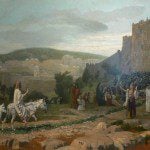Lectionary Reflections
Genesis 15:1-12, 17-18
February 24, 2013
Genesis 15 is perhaps much more important for what happens to it in later interpretations than for what it actually says. This account of the covenant that YHWH makes with Abram is not the only covenant story in Genesis. Genesis 17 describes a covenant of circumcision, and Genesis 9 offers the Noahic covenant of the bow in the cloud, signaling YHWH's eternal presence and unbreakable grace with the earth. Even Genesis 22, and its harrowing story of the near sacrifice of Isaac, is a kind of covenant wherein YHWH discovers Abraham's willingness to follow the command of his God, no matter how terrible, and thus receives God's unique blessing. YHWH is above all a covenant-making God.
Learning from Covenant: Lesson 1, Faith Not Works
Two very important ideas were taken from this rather bizarre passage, both of which have had crucial, and in one of the cases dangerous and tragic, consequences. The first of these ideas was promulgated by the apostle Paul. Genesis 15:6 reads: "And he (Abram) believed YHWH, and YHWH counted it to him as righteousness." When Paul heard these words, his theological mind conjured a particular understanding of the relationship between Abram and YHWH. That relationship, reasoned Paul, was based on Abram's simple conviction that YHWH's words concerning Abram's future greatness were true. And because Abram trusted God's words without question, God counted that trust as righteousness. And then Paul went on to make his central theological claim. Because God had not offered the law to Abram until Genesis 17, the law of circumcision, that meant that Abram had been found to be righteous apart from the law of Judaism. Hence, for Paul, the law does not make a person righteous; only God can make one righteous, when the believer in God's word is truly faithful. Paul spins this idea out most clearly in Romans 4, but it pervades his reflections in all of his letters.
"The righteous (the just) shall live by faith," thunders Paul again and again, not by the works of the law. "The things I know to do I do not do," he laments in Romans 7, implying that his own actions can never reconcile him to God; he must trust the mercy and gift of God if he is to find a relationship with that God. This central Pauline idea emerges from his reading of Genesis 15 and 17. And of course Paul's understanding has profoundly influenced Christian theology ever since. Christians affirm that they cannot on their own win the favor of God with their good works, no matter how many, no matter how laudatory. "Thanks be to God through our Lord Jesus Christ," we say with Paul when confronted by our failed attempts to be good enough on our own. In short, Genesis 15:6 becomes the kernel of one of Christianity's most basic claims.
Learning from Covenant: Lesson 2, the Dangerous One
The second extrapolation from Genesis 15 is the more dangerous one. After YHWH has sealed the covenant with Abram by means of the "smoking fire pot and the flaming torch" (.5:17) passing between the sacrificial animals prepared by Abram, YHWH announces the gift of the land:
To your offspring (literally "seed") I give this land, from the river of Egypt to the great river, the river Euphrates, the land of the Kenites, the Kenizzites, the Kadmonites, the Hittites, the Perizites, the Rephaim, the Amorites, the Canaanites, the Girgashites, and the Jebusites (Gen. 15:19-20).
(I assume that the collectors of the lectionary reading left off all of the names of these various peoples due to a certain fear that tongue-tied readers might incur public embarrassment, stumbling helplessly over the ancient names.)
The fact is that we cannot in our time be certain just who some of these peoples are! The Kenites are apparently wandering tribes of metal workers, if 1 Samuel 15 serves as guide. The Hittites are a hugely important people, occupying for a millennium the high plateaus of what is contemporary Turkey and leaving behind significant writing, art, and technology. One of David's generals, the ill-fated Uriah (2 Sam. 11), was of Hittite descent, some 500 years after his ancestors' civilization ceased to exist. "Amorites" is a common designation for those who lived in the land of "Canaan" before the coming of the Israelites, and of course the Canaanites are a similarly designated group. The Jebusites lived in Jerusalem before David captured the city and made it his capital (2 Sam. 6). The other five names in the list are more obscure and the subject of scholarly speculation only.
The basic point of the list seems to be to make clear that all persons and groups who currently dwell in the land YHWH promises to Abram and his seed shall be removed from the land in favor of God's chosen ones. And the boundaries of that land are said to stretch from "the river of Egypt" (not the Nile, but apparently the wadi Arish, a stream that bifurcates the northern section of the Sinai peninsula) to "the great river, the river Euphrates," well known in the ancient and modern world as the southern border of many significant kingdoms, from Old and New Babylonian to the modern Iraq. These borders define the realm of David when it reached its greatest land mass during his 10th-century B.C.E. kingship.





